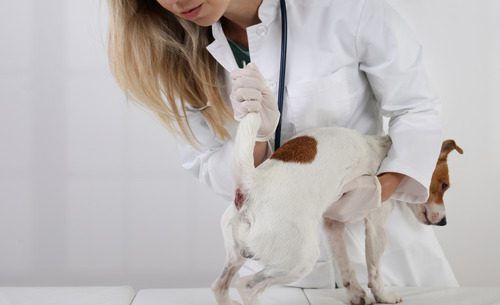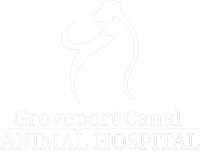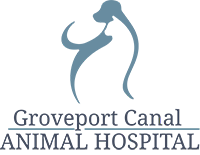What Is Dog Anal Gland Expression?
If you’ve ever noticed your dog scooting across the floor or licking excessively at their rear end, you might have wondered what’s going on. These behaviors often point to an issue that requires a dog anal gland expression. While it’s not the most glamorous topic, understanding why dogs need their anal glands expressed and how veterinarians handle it is an important part of maintaining your pet’s comfort and health. Today, we’ll explore everything you need to know about dog anal gland expression, why it matters, and when it’s time to schedule an appointment. If you think your dog may need help with this issue, Groveport Canal Animal Hospital is here to assist. Call us at (614) 836-3222 or book an appointment online!

What Are Anal Glands and Why Do Dogs Have Them?
Anal glands are two small sacs located on either side of a dog’s anus, positioned roughly at the 4 o’clock and 8 o’clock points. These sacs contain a strong-smelling fluid that dogs use to mark territory and communicate with one another. In the wild, this scent marking was essential for survival and social behavior.
For many domesticated dogs today, anal glands still serve a purpose but can sometimes cause problems. Normally, the pressure of a dog’s bowel movements will naturally express these glands. However, if the fluid becomes too thick or the sacs fail to empty on their own, issues can arise that require professional dog anal gland expression.
Common Causes of Anal Gland Problems
Several factors can contribute to a dog’s anal gland issues, including:
- Chronic soft stools or diarrhea
- Obesity
- Allergies (food or environmental)
- Anatomical issues with the anal sacs
- Infections or impactions
When the glands are not expressed naturally, they can become impacted, inflamed, or even infected, leading to discomfort for your dog.
Signs Your Dog May Need Anal Gland Expression
Recognizing the signs early can help prevent more serious complications. Some common indicators that your pet may need dog anal gland expression include:
- Frequent scooting or dragging their rear end along the floor
- Excessive licking or biting at the anal area
- Swelling or redness around the anus
- A sudden, strong fishy odor
- Difficulty sitting comfortably
- Signs of pain when defecating
If you notice any of these behaviors, it’s a good idea to contact your veterinarian at Groveport Canal Animal Hospital. Prompt attention can prevent a minor annoyance from becoming a more serious health concern.
What Happens During a Dog Anal Gland Expression Appointment?
When you bring your dog to Groveport Canal Animal Hospital for a dog anal gland expression, our veterinary team takes every step to ensure your pet is comfortable and cared for.
The Process of Expression
There are two methods veterinarians can use: external and internal expression. External expression involves applying gentle pressure from the outside of the glands, while internal expression involves inserting a gloved, lubricated finger into the rectum to empty the glands more thoroughly. Veterinarians prefer the internal method because it ensures complete expression and allows them to check for signs of infection, impaction, or abscesses. Throughout the procedure, your dog’s comfort and safety remain the priority.
What If There Are Complications?
If the glands are impacted, infected, or abscessed, your veterinarian may recommend additional treatments such as:
- Flushing the glands with a medicated solution
- Administering antibiotics
- Prescribing anti-inflammatory medications
- Recommending dietary changes to promote firmer stools
By addressing the issue early, the veterinary team can help your dog heal quickly and avoid more serious problems.
Can Some Dogs Require Regular Anal Gland Expression?
Not every dog will need their glands expressed regularly. However, certain pets may be more prone to gland issues based on their size, anatomy, or underlying health problems.
Factors That May Make Regular Expression Necessary
Dogs who may need routine dog anal gland expression include:
- Small breeds like Chihuahuas, Toy Poodles, and Dachshunds
- Dogs prone to allergies
- Pets with chronic gastrointestinal issues
- Overweight dogs with extra pressure in the anal area
For these pets, your veterinarian may recommend a maintenance schedule. Regular appointments can help prevent discomfort and reduce the risk of infections.
How Diet and Health Impact Anal Gland Expression
Your dog’s overall diet and health play an important role in how well their anal glands function. A healthy diet that promotes firm, well-formed stools naturally aids the body in expressing the glands during bowel movements.
Nutritional Tips to Support Anal Gland Health
Consider the following dietary strategies:
- Feed a high-fiber diet to encourage bulkier stools
- Offer healthy treats and avoid excessive table scraps
- Maintain a consistent feeding schedule
- Discuss special supplements with your veterinarian if needed
In some cases, switching to a veterinary-recommended diet can significantly improve stool quality and support healthier anal gland function.
Why Professional Dog Anal Gland Expression Is Recommended
While some groomers offer dog anal gland expression as part of grooming services, professional veterinary care remains the safest and most thorough option.
The Advantages of Veterinary Care
Choosing a veterinary team for anal gland expression ensures:
- Proper technique that fully empties the glands
- Early detection of infections or abnormalities
- Gentle handling that minimizes discomfort
- Customized care plans based on your dog’s specific needs
If gland issues are left untreated or improperly managed, they can escalate into painful abscesses or severe infections that may require surgery. Having a trusted veterinary team perform the procedure helps avoid these outcomes.
Helping Your Dog Stay Comfortable and Healthy
Caring for your dog involves more than just regular walks and belly rubs—it also means addressing less glamorous health needs like dog anal gland expression. Monitoring your dog’s behavior, scheduling veterinary checkups, and maintaining a healthy diet all contribute to your pet’s overall well-being. If you notice any signs that your dog may be uncomfortable, don’t wait. Early intervention can make a significant difference in your pet’s comfort and happiness. The team at Groveport Canal Animal Hospital is ready to help. Call us at (614) 836-3222 or book an appointment online today to discuss your dog’s needs and keep them feeling their best.

